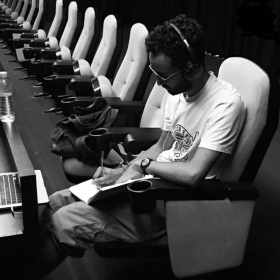It has been quite a while since I started this course; I was really keen to finish it but jobs, essays and life in general just got in the way, which happens. But this is one of the things I love most about using FutureLearn - as long as you are registered on the course then you have access to the materials for as long as you need them! That means that if you fall behind or something gets in the way then you won't miss out.
If you have read Part I or Part II to this piece you will know that I was super keen to try the new Literature and Mental Health course which has been exploring how reading literature, books and poetry can help us improve our mental health, or even be used as therapy. The idea that art therapy may be used to treat mental health issues is a huge debate in the arts and healthcare sectors at the moment. However, while there is no doubt that art, specifically reading, is good for your brain, your mood and your general wellbeing, it is hard to put this into practice. Firstly because art has different effects on different people, and secondly because of the logistics: how do we prescribe reading?
This is something that has taken off recently with the advent of Reading Well: Books on Prescription. While this is a really exciting development in the field it is also a difficult area; one that this course has aimed to explore. As each week was themed around a different mental health issue, the last two weeks covered Depression and Bipolar disorder, and Aging and Dementia.
The topics covering depression and bipolar were some of the most interesting on the whole course, as well as the most difficult. Reading sections from Black Rainbow by Rachel Kelly and Polar Bears by Mark Haddon were really enlightening in terms of reflecting the experience of what it must be like to suffer from one of these conditions. Polar Bears was probably my favourite text of the whole course as it was funny, sad, engaging and very easy to relate to.
The last week on ageing and dementia was interesting particularly because it covered King Lear - one of my favourite Shakespeare plays. I liked the differing perspectives that were offered from actors who played Lear, which meant that the course was allowing me to explore the issue rather than telling me what to think.
As usual there were a mixture of articles, reading tasks, video discussions, activities and questionnaires within these last two weeks. I would have been very keen to see more of the activities as these offered the chance for interaction.
Overall I have really enjoyed this course. While it didn't offer any conclusion on whether reading can be used therapeutically, it did explore the issue in depth and encourage me to think about it from a range of perspectives. From doing this course it is clear that literature can offer something beneficial to those who want to maintain or improve their mental health, as well as to those with diagnosable conditions. There are a lot of issues in terms of how to put this idea into practice but I am happy to see that Warwick University are researching this as well as getting the word out and raising awareness through the course.










This is the best one so far! I think this series is becoming more and more important. You're doing a great job by writing pieces which are mixes between your own experiences using their tools and advertising just how effective they are.